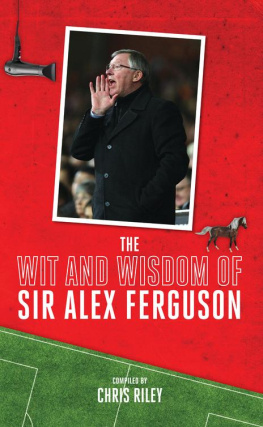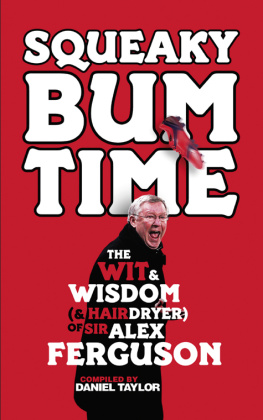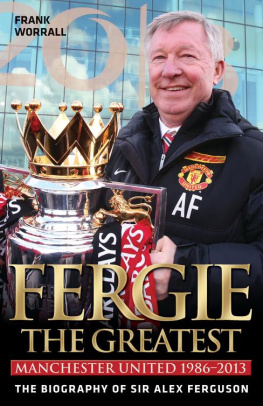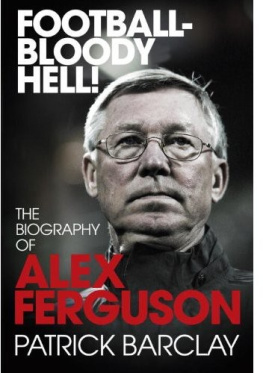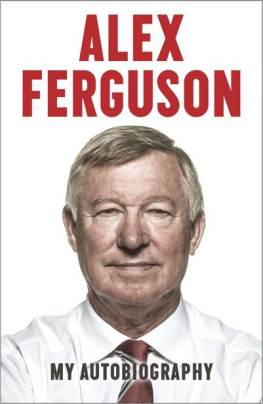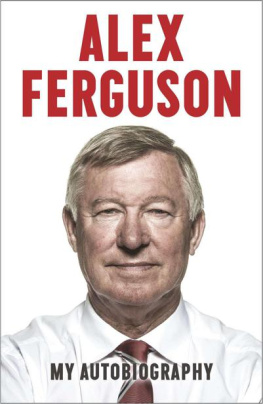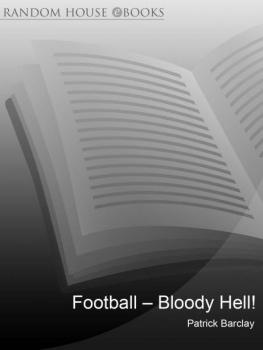S ir Alex Ferguson is a true legend in the world of football. Following a career as a prolific striker in Scotland, Ferguson or Fergie really made his name as a manager, first at St Mirren and Aberdeen, and then, more notably, at Manchester United.
Following the sacking of Ron Atkinson, Sir Alex was appointed manager of Manchester United on 6 November 1986. At the time, Manchester United was a sleeping giant, having failed to win a league title since the glory years of Sir Matt Busbys team in the 1960s.
Despite an inauspicious start he lost his first game 20 away at Oxford United the club had great faith in Fergusons ability and were duly rewarded when his team lifted the FA Cup in 1990, followed by the Premier League trophy three years later.
From this moment on, Fergusons United sides would dominate English football for the next twenty years, delivering success with a regularity likely never to be repeated.
Ferguson would win a total of thirty-eight trophies while at Manchester United, in addition to the eleven he won as a manager north of the border.
Never one to shy away from controversy, Fergie has made some memorable remarks. Opposing players, managers, clubs and referees have all been on the receiving end of his acerbic tongue and this book brings together the best of his utterances, as well as some of the responses they have provoked. It also delves into his famous managerial techniques and looks at the legacy he leaves on the game.
1941: Alexander Chapman Ferguson is born on 31 December in Govan, Glasgow.
1957: Makes his playing debut as a sixteen-year-old amateur for Queens Park.
1960: Despite averaging just below a goal a game, Ferguson cant hold down a regular starting place, and moves to St Johnstone.
1964: Ferguson continues to score goals on a regular basis but again finds himself out of the team and moves to Dunfermline, becoming a full-time professional footballer.
1967: An impressive record of sixty-six goals in just eighty-nine games convinces Rangers to part company with 65,000 to secure his services, then a record fee for a transfer between two Scottish clubs.
1974: Retires as a player at the age of thirty-two and is appointed manager of East Stirlingshire. However, he leaves this role in October to move to St Mirren after taking advice from legendary manager Jock Stein.
1977: Wins his first trophy as a manager as his St Mirren team are crowned First Division champions.
1978: Appointed Aberdeen manager.
1980: Aberdeen are crowned Scottish champions, the first time in fifteen years the league has not been won by either Celtic or Rangers, and Aberdeens first title since 1955.
1983: Wins his first European trophy as Aberdeen defeat Real Madrid in the final of the European Cup Winners Cup. Ferguson is awarded an OBE.
1985: Takes over as Scotland manager after the sudden death of mentor Jock Stein but leaves the post the following year.
1986: Fergusons success in Scotland attracts the attention of Manchester United, who appoint him manager following the sacking of Ron Atkinson.
1990: Wins his first trophy, the FA Cup, as United manager. His side beat Crystal Palace 10 in a replay.
1993: United win their first title since 1967 and follow it by winning the league and cup double the subsequent year.
1995: Ferguson is awarded a CBE.
1999: Arguably Sir Alexs greatest year. Manchester United complete the treble by winning the Premier League, the FA Cup and the Champions League, Uniteds first European triumph since Sir Matt Busbys iconic side of 1968. They finish the year as world champions after defeating Brazilian side Palmeiras 10 in the final of the Intercontinental Cup. Ferguson is knighted.
2001: Ferguson announces his intention to retire following the 2001/2 season; however, he signs a new contract the following February.
2004: Wins his fifth and final FA Cup, a record in the modern era.
2008: Manchester United become European champions for the second time under Fergusons guidance, defeating Chelsea 65 on penalties after a 11 draw.
2010: Overtakes Sir Matt Busby as Manchester Uniteds longest-serving manager.
2011: United beat Chelsea into second place to record their nineteenth league title, surpassing Liverpools eighteen and knocking them off their perch in the process.
2013: Announces his retirement as manager of Manchester United after 1,500 matches and twenty-six years in charge, winning thirty-eight trophies in the process. Sir Alex announces he will continue at the club as a director and ambassador.
St Mirren
Scottish First Division (1):1976/7
Aberdeen
Scottish Premier Division (3): 1979/80, 1983/4, 1984/5
Scottish Cup (4): 1981/2, 1982/3, 1983/4, 1985/6
Scottish League Cup (1): 1985/6
UEFA Cup Winners Cup (1): 1982/3
UEFA Super Cup (1): 1983
Manchester United
Premier League (13): 1992/3, 1993/4, 1995/6, 1996/7, 1998/9, 1999/2000, 2000/2001, 2002/3, 2006/7, 2007/8, 2008/9, 2010/11, 2012/13
FA Cup (5): 1989/90, 1993/4, 1995/6, 1998/9, 2003/4
League Cup (4): 1991/2, 2005/6, 2008/9, 2009/10
FA Charity/Community Shield (10): 1990 (shared with Liverpool), 1993, 1994, 1996, 1997, 2003, 2007, 2008, 2010, 2011
UEFA Champions League (2): 1998/9, 2007/8
UEFA Cup Winners Cup (1): 1990/1
UEFA Super Cup (1): 1991
Intercontinental Cup (1): 1999
FIFA Club World Cup (1): 2008
I cant believe it. I cant believe it. Football. Bloody hell!
In the aftermath of Manchester Uniteds dramatic win in the 1999 Champions League Final. His side scored two goals in injury time to beat Bayern Munich 21 and win the worlds premier club competition for the first time in thirty-one years.
The players couldnt pick each other out. They said it was difficult to see their teammates at distance when they lifted their heads. It was nothing to do with superstition. This club went twenty-six years without winning the league and we didnt think about changing the red shirts. Its nothing to do with that at all.
Fergusons famous excuse for Manchester Uniteds terrible performance in the first half of a match against relegation favourites Southampton in 1996. Losing 30 at half-time, United changed into their blue-and-white third strip for the second half. They lost the game 31, and the kit was never worn again.
I cant understand the Leeds players. Im absolutely in support of their manager [Howard Wilkinson]. He doesnt deserve his players. If they had played like that all season theyd be near the top. They raised their game because they were playing Manchester United. It was pathetic. I think we can accept any club coming here and trying their hardest, so long as they do it every week.
Accusing the Leeds United side of trying harder than usual in a match against Manchester United in 1996. Newcastle United manager Kevin Keegan was so outraged by Fergusons comment that he launched into the now infamous Id love it rant. Fergusons side overhauled Newcastles twelve-point lead, and eventually won the league by four points.
My greatest challenge is not what is happening right at this moment, my greatest challenge was knocking Liverpool right off their fucking perch. And you can print that.

